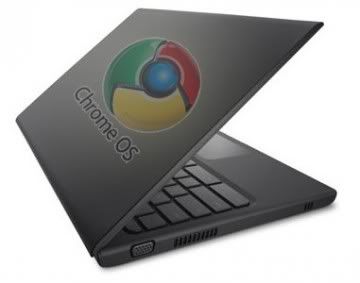Over the last few years, after seeing the popularity of internet-focused netbooks, programmers and engineers have been working on a completely new operating system. Though it isn't slated to be available for installation to other systems, it will be available installed on new computers. Since they have finally revealed working prototypes and distributed them selectively, it has become evident that it is a linux-based operating system focused on moving most of the computing process to a virtual, web-based realm. Moreover, the operating system has been streamlined, even including keeping the computer from attempting to boot from removable media. That part may sound a little complex, but, basically, the whole concept of using a disc (removable media) to boot the computer is a dated concept, and attempting to boot from those devices first creates an unnecessary lag. So, considering that they are attempting to steer most computing towards a virtual realm (a concept they call "chromoting") and that they are attempting to streamline the operating system, I can only assume they are trying to increase the felt speed and efficiency of low-cost systems with low-power processors. Well, after a few testers throwing up their reviews, it seems to be a success, and they are managing to create the equivalent of netbooks with lightning-quick startup times.
So, other than a little more efficiency on a low cost, what could this new, supposedly revolutionary, system provide? Well, after watching one of their promotional videos (link below), the benefits of moving traffic to an virtual realm become evident. Let me summarize. The gentleman in the video is working on a document, or a project, on his computer, but people keep coming into the room and destroying it. Each time, he is brought a replacement, and, after a quick startup, he is back to where he left off. How could this be? Well, as is the intended use of this system, his document was on Google Documents, and none of the data was stored on the hardware of the system itself. As such, he was able to jump right back in.
After thinking about the whole system, though it materializes as a definite shift in computer operating system technology, I think it came too late. About five or six years ago, as people were still concerned about the failure rate of computing hardware, it might have been nice not to have vital information stored on it. People spent a lot of time and money duplicating and backing up their information in order to ensure its security. Nowadays, hardware and software is almost idiot-proof, and I can't even remember the last time I actually had such a malfunction or failure affect me. Though, to me, that seems like enough security and peace of mind with regards to information, some people even go so far as to back up most of their files to an external hard drive or a thumb drive. So, considering that, I can only think of a couple scenarios that would justify ownership of such a system. The first situation I can think of is that you are the type of person who finds themselves consistently having accidents that damage or destroy your hardware. That type of person would probably benefit from storing their information in such locations as Google documents, or moving it to an external source (thumb/flash or external drive) but there is nothing to stop them from doing that now. The only thing gained by switching to a CR-48 or the like would be the somewhat low cost of replacing their hardware without having to deal with slow, overburdened netbooks common today. The second type of person that comes to mind is someone who consistently finds themselves moving about, never with a laptop, and needs consistent access to their information. Once again, this person would greatly benefit from either carrying a flash drive or moving their intellectual property to an online medium, and, once again, there is nothing stopping them from doing that now. I don't even think they would gain much from buying such a laptop because, if they are the type of person who can't remember a netbook, I don't think they would remember to bring any other form of laptop or notebook. From a business-level standpoint, cloud computing holds a lot of possibilities, but I'm trying to look from a consumer (me) standpoint. Keeping everything in a virtual realm is great system for those people, and cloud computing is a major step up from remote desktops and virtual private networks, but I guess I find myself analyzing this from a personal perspective. I am a consumer with no such needs, and I think I share that place with a majority of society.
So, in the end, it's a new and fantastic technology, a leap in functionality, but that doesn't make it needed. I think it came too late, making it almost obsolete and irrelevant at release. If you find yourself in the market for an inexpensive laptop or netbook when these things hit retailers sometime next year, I don't think you would be disappointed. It's slated to be an inexpensive ($300-400) alternative to higher end laptops, still present a relatively respectable operating speed but at a lower cost. I just can't endorse it as anything that someone should go out of their way to obtain. I could be proven wrong by the user feedback that will follow (it was only released three days ago), but it's just not for me (even though I'm a huge Google and Google Chrome browser fan). I know it may sound jaded and smug, but, with the way the electronics market looks these days, a Macbook is about as close as I'll probably let myself get to saying I bought a chrome laptop.
Links:
How to Remain Calm Despite What's About to Happen to Your Chrome Notebook: Video

No comments:
Post a Comment